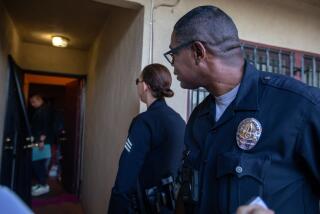Racial State of Emergency Ends in Philadelphia
- Share via
PHILADELPHIA — Mayor W. Wilson Goode ended a six-week state of emergency Friday in racially troubled southwest Philadelphia, but retained 24-hour police protection at several homes as part of a new anti-prejudice plan.
“We must be more vigilant in protecting the basic rights guaranteed by the Constitution,” the mayor said in requesting federal and state officials to investigate and prosecute more of those who violate civil rights laws.
“Recent acts of racial violence, including two nights of angry demonstrations and the firebombing of a home, are clear indications that we must be more vigilant,” he said at a press conference.
Goode was referring to street protests last month, when more than 300 neighbors demonstrated against the purchase of homes in the area by a black family, who have since moved, and a racially mixed family who have refused to leave and are being provided around-the-clock police protection.
“Racial violence and intimidation are wrong and will not be tolerated in this city, in any neighborhood,” the mayor said.
He said the nine-point anti-prejudice program was designed “to eliminate threats to the city’s civic welfare and to the health, safety and property of all citizens.” The program was in the form of an executive order and most of its provisions are already under way. The rest will be in effect by the end of the month, Goode said.
The plan replaces the state of emergency the mayor declared on Nov. 22. It barred gatherings of four or more people except to conduct normal business, such as going to school or to church, shopping or waiting for a bus or cab.
The mayor’s program includes:
--Increased overall law enforcement.
--Establishment of a “crisis management system” to “ensure early warning of the existence of racial tension (and) provide a means for sufficient reactions.”
--Establishment by the Commission on Human Relations of a long-range plan to educate residents of neighborhoods experiencing intergroup tensions.
--Initiation of programs for unemployed young people, especially those who exhibit violent and disruptive behavior in schools and on transit lines, and to encourage businesses to provide jobs in depressed neighborhoods.
--Establishment by public and parochial school principals of more education and training in racially sensitive areas.
More to Read
Sign up for Essential California
The most important California stories and recommendations in your inbox every morning.
You may occasionally receive promotional content from the Los Angeles Times.













